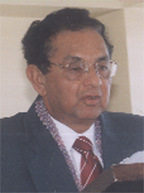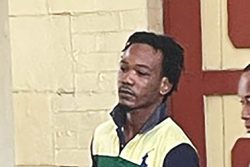The Police Complaints Authority, which received 364 complaints against members of the Guyana Police Force for all of 2009, had to deal with exactly one complaint a day. Justice Cecil Kennard – a retired Chancellor of the Judiciary who is currently Chairman of the Authority – is hard pressed by this volume of work. He readily admits that he does not possess the administrative resources, investigative capability or the legislative authority to perform his functions effectively.

The Police Complaints Authority Act established the Authority twenty-one years ago in June 1989 during President Desmond Hoyte’s People’s National Congress Administration. It was intended to serve as an independent investigative institution which could receive complaints from members of the public about alleged criminal offences committed by members of the Guyana Police Force. The Authority, however, is neither independent nor investigative. It is completely dependent on the Ministry of Home Affairs for staffing and financing. It is also completely dependent on the Guyana Police Force for the conduct of investigations.
Indiscipline in the Police Force, in 1990 as in 2010, had become a chronic crisis. The Police Discipline Act which was in force, however, was inadequate to deal with the flood of complaints about police misconduct from the public. The Authority was intended to police the Police Force. But has it been able to do so?
The Authority’s procedures are ponderous in the extreme. A person who feel that he or she has been wronged by members of the Police Force are required to lodge a complaint with the Authority who will determine whether the matter is ‘minor’ or ‘major.’ A minor case, for example, is one in which a policeman or woman has behaved in a rude manner to a member of the public. In such a case, the Authority could simply and informally notify the Commander of the Police Division in which the incident occurred and report the offending officer. “It will then be up to the Commander to have a word with the policeman or woman in question,” Kennard said, “and this allows us to immediately handle such minor matters.”
Once a member of the public lodges a complaint about a ‘major’ matter that is deemed to be serious enough to be investigated, the Authority is obliged to refer the complaint to the Commissioner and await his response before making recommendations. This could be the start of a slow process.
Most complaints within the Guyana Police Force are investigated by the Office of Professional Responsibility. The Office, which was established during 1997 but started actual operation in 1999, also investigates police misconduct and is headed currently by Mr Mohamed Jameer – himself a former Assistant Commissioner of Police. The Office’s objectives, mainly, are to investigate complaints of alleged misconduct made against members of the Force. It is staffed by uniformed policemen who record statements and conduct investigations only into such matters as are referred to it by the Commissioner. The Police Force no longer has a resident Legal Adviser hence all matters must be referred to the Director of Public Prosecutions for advice.
Mr Kennard explained that the Authority is the first to examine a written complaint against a policeman. He explained “I will look at it to see whether there is any merit in it and, further, whether it relates to misconduct on the part of members of the Police Force…If there is merit, I would send it to the Commissioner for investigation and report.” After the report is forwarded to the Commissioner of Police he then assigns someone, usually from the Force’s Office of Professional Responsibility, to investigate. On conclusion of investigation, the report and relevant statements are forwarded, by the Commissioner to the Authority where the file is examined. It is then determined whether disciplinary charges, as distinct from criminal charges, should be instituted.
If it is decided that disciplinary charges will be instituted then the matter is forwarded to the Commissioner for a departmental hearing. This procedure is applicable to constables and subordinate officers. Hearings of complaints against officers of the ranks of Inspector to Assistant Commissioner must be done by the Police Service Commission. If the police officer is found guilty at the end of the hearing, the file will be referred to the Authority so that an appropriate penalty can be recommended. Penalties can range from confinement to barracks; reprimand; reduction in rank; the award of extra duties; transferral from current district; a monetary fine or, in very serious cases, dismissal, depending on the seriousness of the alleged misconduct.
When investigations are satisfactorily conducted, the Authority will indicate to the Director of Public Prosecution whether the officer should be charged and will recommend an appropriate charge. Mr Kennard thought that the entire process – from complaint to sentencing – should be completed within two months. The time taken to complete a report has often been longer as it depends entirely on the Police Force.
The plain truth is that the Police Force’s departmental disciplinary mechanism is reactive. The Commissioner is the sole authority for initiating investigations into the misconduct of members of the Police Force hence, the investigative function is ponderous and highly centralised. The slowness of the process and sheer volume of complaints have not deterred policemen from behaving badly. The Police Complaints Authority and Police Service Commission do not possess the capabilities to conduct independent investigations. They cannot properly investigate, much less prevent, criminality. As a result, abuses have been recurring with frightening frequency.
Internal police investigative units are no substitute for an independent Authority that is fearless and unrelenting in its pursuit of the truth where members of the public believe that a crime has been committed by the police. Even when police officers do face charges, lower magistrate courts, where other police officers serve as the prosecutors, hear most of the cases. Human Rights activists have questioned officers’ commitment to both investigating and prosecuting their colleagues.
The incapacity of the Authority to protect the public from police abuses has eroded public confidence in its usefulness as a watchdog. The Authority received 341 complaints from citizens in the first year of its operation in 1990 and, although the number fluctuated over the years, it was still high at 364 in 2009. Neglect of duty has been among the leading complaints made against members of the Force. Kennard explained that ‘neglect of duty’ constitutes officers’ failure to perform their policing obligations. Other complaints have been about acting in a manner likely to bring discredit to a member of the Force; corrupt transactions; illegal searches; lack of civility to a member of the public; unlawful arrest; the use of unnecessary force and, most gravely, unlawful killings.
Over the twenty-one years of its existence, the Authority has not succeeded in restraining delinquent policemen. The Disciplined Forces Commission identified the problem back in May 2004 and made six specific recommendations to improve the Authority’s efficacy. Those recommendations – that members of the Police Force should be given training and instruction to create awareness of their responsibilities under the Police Complaints Authority Act; that the Authority should be provided with an investigative team consisting of trained police investigators who are directly responsible and accountable to the Authority; that all investigators functioning in such a capacity should be seconded and transferred to the Authority for the purpose of transparency; that the staffing of the Authority should be completed in accordance with its legislation utilising retired police officers and others with requisite skills and competence, and that the independence of the Authority should be maintained by providing more administrative and financial resources – are still to be realised.
Mr Kennard, as time went by, became even more convinced that the Authority needed its own investigation unit. He describes as “sensible” the recommendation of the Commission. He pressed the need for the establishment of such a unit because, in addition to the widely-held perception that the Police Force is jealous of its reputation and protects its own, the investigations take a long time. It was frustrating for him to have to tell the complainants repeatedly that he could not give them redress because he himself was awaiting the findings of the Police.
Mr Kennard, refers to Act which states “The Minister shall provide the Authority with a Secretary and such other officers and employees as are required for the proper performance of his functions.” He feels that the Minister of Home Affairs could provide him with officers who are not associated with the Police Force to undertake the supervision of the investigations with which the Authority is charged.
Both President Bharrat Jagdeo and the former Minister of Home Affairs Ronald Gajraj have promised to implement measures to strengthen the Authority. It is these men who determine the future of the Police Complaints Authority.









